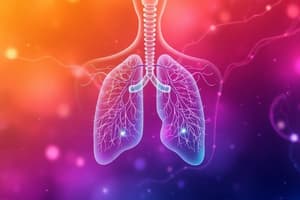Podcast
Questions and Answers
What is the primary energy source released during respiration?
What is the primary energy source released during respiration?
- Electrical energy
- Mechanical energy
- Thermal energy
- Chemical energy (correct)
What is the byproduct of food oxidation during respiration?
What is the byproduct of food oxidation during respiration?
- CO2 (correct)
- H2O
- O2
- C6H12O6
What is the role of enzymes in respiration?
What is the role of enzymes in respiration?
- To oxidize respirable substances
- To catalyze the oxidation-reduction process (correct)
- To release energy from food
- To reduce O2 to H2O
What is the ratio of absorbed O2 to liberated CO2 during respiration?
What is the ratio of absorbed O2 to liberated CO2 during respiration?
What happens when living cells respire in a closed system?
What happens when living cells respire in a closed system?
What percentage of air is occupied by atmospheric O2 in a closed system?
What percentage of air is occupied by atmospheric O2 in a closed system?
Flashcards are hidden until you start studying
Study Notes
Respiration Overview
- Respiration is an energy-releasing process from food, involving oxidation-reduction of respirable substances like carbohydrates, proteins, and fats.
- The process produces CO₂ and absorbs O₂, releasing chemical energy stored in the substances.
Respiration Reaction
- C₆H₁₂O₆ (glucose) + O₂ → Energy + CO₂ + H₂O
Oxygen Absorption and CO₂ Liberation
- Living cells respire continuously, absorbing O₂ and liberating CO₂ in a 1:1 ratio.
- Absorbed O₂ is reduced to H₂O by accepting electrons (e⁻).
Respiratory Process in a Closed System
- In a closed system, if living cells respire in the presence of atmospheric O₂, a vacuum will be created as O₂ is exhausted to produce CO₂.
- The vacuum will not exceed 20% of the volume, as atmospheric O₂ occupies 20% of the air in the closed system.
Objectives
- Study the respiration process in living cells.
- Evaluate the absorption of O₂ and liberation of CO₂ during respiration.
Studying That Suits You
Use AI to generate personalized quizzes and flashcards to suit your learning preferences.




